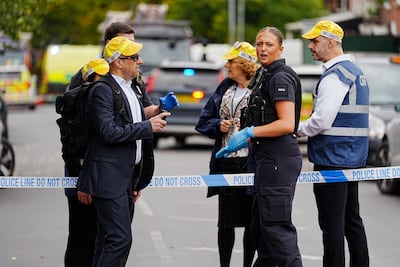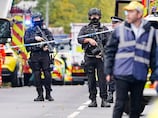A fast-moving anti-terror response played out for more than six minutes in Manchester on Thursday after a witness called in the car-ramming and stabbings at the Heaton Park mosque.
On Yom Kippur, when the Jewish community was gathered to observe together, the attacker appeared determined to break into the synagogue to cause mass casualties.
At 9.31am the first call to the emergency services reported a man had been stabbed. Firearms officers were posted at 9.34am, and the commanders declared a major incident at 9.37am.
By then, it was known that a vehicle was used to ram the crowd, and shots were fired at 9.38am. Police reported one man was shot, believed to be the offender. Paramedics arrived at the scene at 9.41am.
A video shared from across the street showed the attacker trying to use a knife to get through a security grill, while a padded belt raised suspicions of an explosive device.
By 11.30am the hospitals in the area had been locked down, and by 11.42am a bomb disposal van had arrived at the scene.
By 2.10pm, an explosion was heard as the police sought to break into the attacker's car.
Plato is a set of laid-down rules for emergencies, including activating hospital major incident plans.
The advice given in the UK government manual titled Marauding Terrorist Attacks Supplementary Guidance, assumes internal security staff will be the primary force stopping or dealing with an assailant.
“If an attack starts within your site, consider how lockdown should operate. Should attackers be locked in a zone, potentially with victims, or should people be able to flee but terrorists allowed to maraud?” it asks.
Delay first
Key to keeping casualty numbers low is to delay the attackers’ progress “in finding and killing victims” or preventing people from inadvertently putting themselves into the path.
Protocols advise that a poorly implemented lockdown “can actually increase the risk” to the public and police.
It is also unlikely to help in situations where access is generally not restricted and there are no barriers to lock. It warns too that attacks that commence inside a building may be impeded by locked doors, which could restrict escape or cause a crush.
Zone lockdown
A simple zonal lockdown can be useful for example locking the perimeter of a building when all attackers are outside. With internal doors unlocked, people inside may move freely to safer locations such as higher floors.
At Heaton Park, the doors were sealed by the time the killer got on the grounds, and worshippers praised the role of Rabbi Daniel Walker as the crisis unfolded.
The advice states that preventing lifts and escalators being used by attackers to progress through a building is ideal but usually difficult to implement. In practice, it is only feasible where the building management systems and security systems are integrated. Otherwise, it represents an additional task for security control room operators, who are likely to be overloaded.
Barriers and doors
The document highlights that door and security barriers “will delay the progress of an attack”. Introducing physical barriers such as turnstiles and security doors in combination with security walls provides the best protection.
But any makeshift barrier can be “valuable and may be used for lockdown, even those that are not designed for security use or are physically insubstantial”.
Public announcement systems are also vital, the report said. “Instigating lockdown may significantly alter the best course of action for personnel and members of the public. It is therefore crucial that people are aware that lockdown is in effect.”
Runners
Organisations also need to consider what appropriate action to take if a large crowd is running towards their site, where the cause is not clear. “Should the people be permitted to enter your site in order to seek shelter or should they be locked out?” it states.
Early activation of a lockdown when a nearby attack is detected can “undoubtedly prevent [suspected] terrorists from entering your site”.
Cobra committee
At 2.30pm, Prime Minister Keir Starmer arrived back in the UK after an early exit from a summit in Copenhagen to chair the government's top emergency meeting, Cobra, to direct the response to the Manchester attack.
Mr Starmer had already directed additional security arrangements for British synagogues, which did not go into lockdown but continued to allow all people to worship throughout the day.
Assistant Commissioner Laurence Taylor said the attack had been declared a “terrorist incident”, adding that two people have been arrested and a man was shot dead by armed police. Two people were killed and four more are seriously injured.
KILLING OF QASSEM SULEIMANI
GIANT REVIEW
Starring: Amir El-Masry, Pierce Brosnan
Director: Athale
Rating: 4/5
The specs
Engine: 2.0-litre 4-cyl turbo
Power: 201hp at 5,200rpm
Torque: 320Nm at 1,750-4,000rpm
Transmission: 6-speed auto
Fuel consumption: 8.7L/100km
Price: Dh133,900
On sale: now
UAE currency: the story behind the money in your pockets
The President's Cake
Director: Hasan Hadi
Starring: Baneen Ahmad Nayyef, Waheed Thabet Khreibat, Sajad Mohamad Qasem
Rating: 4/5
Timeline
2012-2015
The company offers payments/bribes to win key contracts in the Middle East
May 2017
The UK SFO officially opens investigation into Petrofac’s use of agents, corruption, and potential bribery to secure contracts
September 2021
Petrofac pleads guilty to seven counts of failing to prevent bribery under the UK Bribery Act
October 2021
Court fines Petrofac £77 million for bribery. Former executive receives a two-year suspended sentence
December 2024
Petrofac enters into comprehensive restructuring to strengthen the financial position of the group
May 2025
The High Court of England and Wales approves the company’s restructuring plan
July 2025
The Court of Appeal issues a judgment challenging parts of the restructuring plan
August 2025
Petrofac issues a business update to execute the restructuring and confirms it will appeal the Court of Appeal decision
October 2025
Petrofac loses a major TenneT offshore wind contract worth €13 billion. Holding company files for administration in the UK. Petrofac delisted from the London Stock Exchange
November 2025
180 Petrofac employees laid off in the UAE
UAE currency: the story behind the money in your pockets
Company Profile
Name: Thndr
Started: 2019
Co-founders: Ahmad Hammouda and Seif Amr
Sector: FinTech
Headquarters: Egypt
UAE base: Hub71, Abu Dhabi
Current number of staff: More than 150
Funds raised: $22 million
The five pillars of Islam
1. Fasting
2. Prayer
3. Hajj
4. Shahada
5. Zakat
Evacuations to France hit by controversy
- Over 500 Gazans have been evacuated to France since November 2023
- Evacuations were paused after a student already in France posted anti-Semitic content and was subsequently expelled to Qatar
- The Foreign Ministry launched a review to determine how authorities failed to detect the posts before her entry
- Artists and researchers fall under a programme called Pause that began in 2017
- It has benefited more than 700 people from 44 countries, including Syria, Turkey, Iran, and Sudan
- Since the start of the Gaza war, it has also included 45 Gazan beneficiaries
- Unlike students, they are allowed to bring their families to France
AI traffic lights to ease congestion at seven points to Sheikh Zayed bin Sultan Street
The seven points are:
Shakhbout bin Sultan Street
Dhafeer Street
Hadbat Al Ghubainah Street (outbound)
Salama bint Butti Street
Al Dhafra Street
Rabdan Street
Umm Yifina Street exit (inbound)
What the law says
Micro-retirement is not a recognised concept or employment status under Federal Decree Law No. 33 of 2021 on the Regulation of Labour Relations (as amended) (UAE Labour Law). As such, it reflects a voluntary work-life balance practice, rather than a recognised legal employment category, according to Dilini Loku, senior associate for law firm Gateley Middle East.
“Some companies may offer formal sabbatical policies or career break programmes; however, beyond such arrangements, there is no automatic right or statutory entitlement to extended breaks,” she explains.
“Any leave taken beyond statutory entitlements, such as annual leave, is typically regarded as unpaid leave in accordance with Article 33 of the UAE Labour Law. While employees may legally take unpaid leave, such requests are subject to the employer’s discretion and require approval.”
If an employee resigns to pursue micro-retirement, the employment contract is terminated, and the employer is under no legal obligation to rehire the employee in the future unless specific contractual agreements are in place (such as return-to-work arrangements), which are generally uncommon, Ms Loku adds.
More on animal trafficking
UPI facts
More than 2.2 million Indian tourists arrived in UAE in 2023
More than 3.5 million Indians reside in UAE
Indian tourists can make purchases in UAE using rupee accounts in India through QR-code-based UPI real-time payment systems
Indian residents in UAE can use their non-resident NRO and NRE accounts held in Indian banks linked to a UAE mobile number for UPI transactions
The specs
Engine: 1.5-litre 4-cyl turbo
Power: 194hp at 5,600rpm
Torque: 275Nm from 2,000-4,000rpm
Transmission: 6-speed auto
Price: from Dh155,000
On sale: now
Global state-owned investor ranking by size
|
1.
|
United States
|
|
2.
|
China
|
|
3.
|
UAE
|
|
4.
|
Japan
|
|
5
|
Norway
|
|
6.
|
Canada
|
|
7.
|
Singapore
|
|
8.
|
Australia
|
|
9.
|
Saudi Arabia
|
|
10.
|
South Korea
|
Specs
Engine: 51.5kW electric motor
Range: 400km
Power: 134bhp
Torque: 175Nm
Price: From Dh98,800
Available: Now
Dengue%20fever%20symptoms
%3Cul%3E%0A%3Cli%3EHigh%20fever%3C%2Fli%3E%0A%3Cli%3EIntense%20pain%20behind%20your%20eyes%3C%2Fli%3E%0A%3Cli%3ESevere%20headache%3C%2Fli%3E%0A%3Cli%3EMuscle%20and%20joint%20pains%3C%2Fli%3E%0A%3Cli%3ENausea%3C%2Fli%3E%0A%3Cli%3EVomiting%3C%2Fli%3E%0A%3Cli%3ESwollen%20glands%3C%2Fli%3E%0A%3Cli%3ERash%3C%2Fli%3E%0A%3C%2Ful%3E%0A%3Cp%3EIf%20symptoms%20occur%2C%20they%20usually%20last%20for%20two-seven%20days%3C%2Fp%3E%0A
Third Test
Day 3, stumps
India 443-7 (d) & 54-5 (27 ov)
Australia 151
India lead by 346 runs with 5 wickets remaining
UAE currency: the story behind the money in your pockets
Killing of Qassem Suleimani
Normal People
Sally Rooney, Faber & Faber
COMPANY%20PROFILE
%3Cp%3E%3Cstrong%3EName%3A%20%3C%2Fstrong%3ESmartCrowd%0D%3Cbr%3E%3Cstrong%3EStarted%3A%20%3C%2Fstrong%3E2018%0D%3Cbr%3E%3Cstrong%3EFounder%3A%20%3C%2Fstrong%3ESiddiq%20Farid%20and%20Musfique%20Ahmed%0D%3Cbr%3E%3Cstrong%3EBased%3A%20%3C%2Fstrong%3EDubai%0D%3Cbr%3E%3Cstrong%3ESector%3A%20%3C%2Fstrong%3EFinTech%20%2F%20PropTech%0D%3Cbr%3E%3Cstrong%3EInitial%20investment%3A%20%3C%2Fstrong%3E%24650%2C000%0D%3Cbr%3E%3Cstrong%3ECurrent%20number%20of%20staff%3A%3C%2Fstrong%3E%2035%0D%3Cbr%3E%3Cstrong%3EInvestment%20stage%3A%20%3C%2Fstrong%3ESeries%20A%0D%3Cbr%3E%3Cstrong%3EInvestors%3A%20%3C%2Fstrong%3EVarious%20institutional%20investors%20and%20notable%20angel%20investors%20(500%20MENA%2C%20Shurooq%2C%20Mada%2C%20Seedstar%2C%20Tricap)%3C%2Fp%3E%0A
Race card
6.30pm: Emirates Holidays Maiden (TB), Dh82,500 (Dirt), 1,900m
7.05pm: Arabian Adventures Maiden (TB), Dh82,500 (D), 1,200m
7.40pm: Emirates Skywards Handicap (TB), Dh82,500 (D), 1,200m
8.15pm: Emirates Airline Conditions (TB), Dh120,000 (D), 1,400m
8.50pm: Emirates Sky Cargo (TB), Dh92,500 (D)1,400m
9.15pm: Emirates.com (TB), Dh95,000 (D), 2,000m
The%20Killer
%3Cp%3E%3Cstrong%3EDirector%3A%C2%A0%3C%2Fstrong%3EDavid%20Fincher%3C%2Fp%3E%0A%3Cp%3E%3Cstrong%3EStars%3A%C2%A0%3C%2Fstrong%3EMichael%20Fassbender%2C%20Tilda%20Swinton%2C%20Charles%20Parnell%3C%2Fp%3E%0A%3Cp%3E%3Cstrong%3ERating%3A%3C%2Fstrong%3E%204%2F5%C2%A0%3C%2Fp%3E%0A
More from Armen Sarkissian









